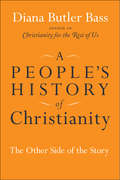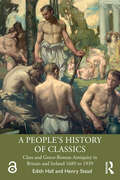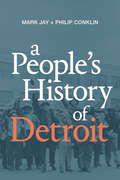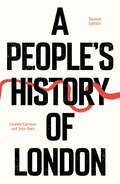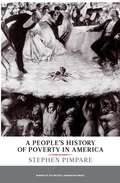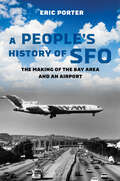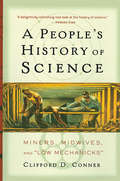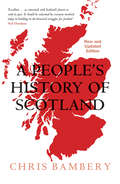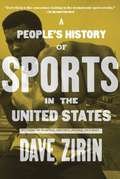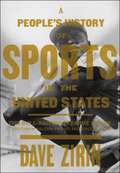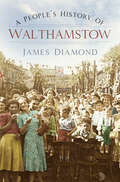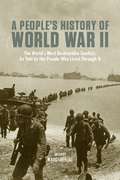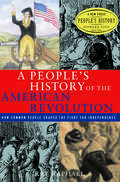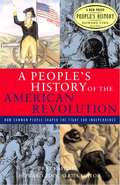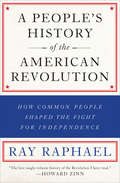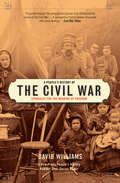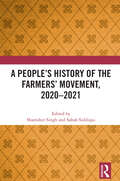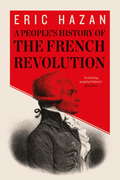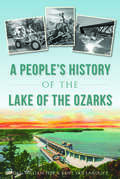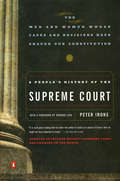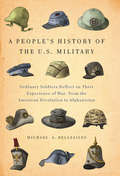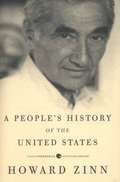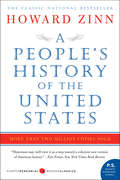- Table View
- List View
A People's History of Christianity: The Other Side of the Story
by Diana Butler BassFor too long, the history of Christianity has been told as the triumph of orthodox doctrine imposed through power and hierarchy. In A People's History of Christianity, historian and religion expert Diana Butler Bass reveals an alternate history that includes a deep social ethic and far-reaching inclusivity: "the other side of the story" is not a modern phenomenon, but has always been practiced within the church. Butler Bass persuasively argues that corrective--even subversive--beliefs and practices have always been hallmarks of Christianity and are necessary to nourish communities of faith.In the same spirit as Howard Zinn's groundbreaking work The People's History of the United States, Butler Bass's A People's History of Christianity brings to life the movements, personalities, and spiritual disciplines that have always informed and ignited Christian worship and social activism.A People's History of Christianity authenticates the vital, emerging Christian movements of our time, providing the historical evidence that celebrates these movements as thoroughly Christian and faithful to the mission and message of Jesus.
A People's History of Classics: Class and Greco-Roman Antiquity in Britain and Ireland 1689 to 1939
by Edith Hall Henry SteadA People’s History of Classics explores the influence of the classical past on the lives of working-class people, whose voices have been almost completely excluded from previous histories of classical scholarship and pedagogy, in Britain and Ireland from the late 17th to the early 20th century. This volume challenges the prevailing scholarly and public assumption that the intimate link between the exclusive intellectual culture of British elites and the study of the ancient Greeks and Romans and their languages meant that working-class culture was a ‘Classics-Free Zone’. Making use of diverse sources of information, both published and unpublished, in archives, museums and libraries across the United Kingdom and Ireland, Hall and Stead examine the working-class experience of classical culture from the Bill of Rights in 1689 to the outbreak of World War II. They analyse a huge volume of data, from individuals, groups, regions and activities, in a huge range of sources including memoirs, autobiographies, Trade Union collections, poetry, factory archives, artefacts and documents in regional museums. This allows a deeper understanding not only of the many examples of interaction with the Classics, but also what these cultural interactions signified to the working poor: from the promise of social advancement, to propaganda exploited by the elites, to covert and overt class war. A People’s History of Classics offers a fascinating and insightful exploration of the many and varied engagements with Greece and Rome among the working classes in Britain and Ireland, and is a must-read not only for classicists, but also for students of British and Irish social, intellectual and political history in this period. Further, it brings new historical depth and perspectives to public debates around the future of classical education, and should be read by anyone with an interest in educational policy in Britain today.
A People's History of Detroit
by Mark Jay Philip ConklinRecent bouts of gentrification and investment in Detroit have led some to call it the greatest turnaround story in American history. Meanwhile, activists point to the city's cuts to public services, water shutoffs, mass foreclosures, and violent police raids. In A People's History of Detroit, Mark Jay and Philip Conklin use a class framework to tell a sweeping story of Detroit from 1913 to the present, embedding Motown's history in a global economic context. Attending to the struggle between corporate elites and radical working-class organizations, Jay and Conklin outline the complex sociopolitical dynamics underlying major events in Detroit's past, from the rise of Fordism and the formation of labor unions, to deindustrialization and the city's recent bankruptcy. They demonstrate that Detroit's history is not a tale of two cities—one of wealth and development and another racked by poverty and racial violence; rather it is the story of a single Detroit that operates according to capitalism's mandates.
A People's History of London
by John Rees Lindsey GermanIn the eyes of Britain's heritage industry, London is the traditional home of empire, monarchy and power, an urban wonderland for the privileged, where the vast majority of Londoners feature only to applaud in the background.Yet, for nearly 2000 years, the city has been a breeding ground for radical ideas, home to thinkers, heretics and rebels from John Wycliffe to Karl Marx. It has been the site of sometimes violent clashes that changed the course of history: the Levellers' doomed struggle for liberty in the aftermath of the Civil War; the silk weavers, match girls and dockers who crusaded for workers' rights; and the Battle of Cable Street, where East Enders took on Oswald Mosley's Black Shirts.A People's History of London journeys to a city of pamphleteers, agitators, exiles and revolutionaries, where millions of people have struggled in obscurity to secure a better future.
A People's History of Poverty in America
by Stephen PimpareIn this compulsively readable social history, political scientist Stephen Pimpare vividly describes poverty from the perspective of poor and welfare-reliant Americans from the big city to the rural countryside. He focuses on how the poor have created community, secured shelter, and found food and illuminates their battles for dignity and respect.Through prodigious archival research and lucid analysis, Pimpare details the ways in which charity and aid for the poor have been inseparable, more often than not, from the scorn and disapproval of those who would help them. In the rich and often surprising historical testimonies he has collected from the poor in America, Pimpare overturns any simple conclusions about how the poor see themselves or what it feels like to be poor-and he shows clearly that the poor are all too often aware that charity comes with a price. It is that price that Pimpare eloquently questions in this book, reminding us through powerful anecdotes, some heart-wrenching and some surprisingly humorous, that poverty is not simply a moral failure.
A People's History of SFO: The Making of the Bay Area and an Airport
by Eric PorterAn illuminating profile of the San Francisco Bay Area, and its regional and global influence, as seen from the focal point of San Francisco International Airport (SFO).A People's History of SFO uses the history of San Francisco International Airport (SFO) to tell a multifaceted story of development, encounter, and power in the surrounding region from the eighteenth century to the present. In lively, engaging stories, Eric Porter reveals SFO's unique role in the San Francisco Bay Area's growth as a globally connected hub of commerce, technology innovation, and political, economic, and social influence. Starting with the very land SFO was built on, A People's History of SFO sees the airport as a microcosm of the forces at work in the Bay Area—from its colonial history and early role in trade, mining, and agriculture to the economic growth, social sanctuary, and environmental transformations of the twentieth century. In ways both material and symbolic, small human acts have overlapped with evolving systems of power to create this bustling metropolis. A People's History of SFO ends by addressing the climate crisis, as sea levels rise and threaten SFO itself on the edge of San Francisco Bay.
A People's History of Science: Miners, Midwives, and "Low Mechanicks"
by Clifford D. ConnerWe all know the history of science that we learned from grade school textbooks: How Galileo used his telescope to show that the earth was not the center of the universe; how Newton divined gravity from the falling apple; how Einstein unlocked the mysteries of time and space with a simple equation. This history is made up of long periods of ignorance and confusion, punctuated once an age by a brilliant thinker who puts it all together. These few tower over the ordinary mass of people, and in the traditional account, it is to them that we owe science in its entirety. This belief is wrong. A People's History of Science shows how ordinary people participate in creating science and have done so throughout history. It documents how the development of science has affected ordinary people, and how ordinary people perceived that development. It would be wrong to claim that the formulation of quantum theory or the structure of DNA can be credited directly to artisans or peasants, but if modern science is likened to a skyscraper, then those twentieth-century triumphs are the sophisticated filigrees at its pinnacle that are supported by the massive foundation created by the rest of us.
A People's History of Scotland
by Chris BamberyA People's History of Scotland looks beyond the kings and queens, the battles and bloody defeats of the past. It captures the history that matters today, stories of freedom fighters, suffragettes, the workers of Red Clydeside, and the hardship and protest of the treacherous Thatcher era. With riveting storytelling, Chris Bambery recounts the struggles for nationhood. He charts the lives of Scots who changed the world, as well as those who fought for the cause of ordinary people at home, from the poets Robbie Burns and Hugh MacDiarmid to campaigners such as John Maclean and Helen Crawfurd. This is a passionate cry for more than just independence but also for a nation based on social justice.From the Trade Paperback edition.
A People's History of Sports in the United States
by David ZirinIn this long-awaited book from the rising superstar of sportswriting, whose blog "The Edge of Sports" is read each week by thousands of people across the country, Dave Zirin offers a riotously entertaining chronicle of larger-than-life sporting characters and dramatic contests and what amounts to an alternative history of the United States as seen through the games its people played. Through Zirin's eyes, sports are never mere games, but a reflection of-and spur toward-the political conflicts that shape American society.Half a century before Jackie Robinson was born, the black ballplayer Moses Fleetwood Walker brandished a revolver to keep racist fans at bay, then took his regular place in the lineup. In the midst of the Depression, when almost no black athletes were allowed on the U.S. Olympic team, athletes held a Counter Olympics where a third of the participants were African American.A People's History of Sports in the United States is replete with surprises for seasoned sports fans, while anyone interested in history will be amazed by the connections Zirin draws between politics and pop flies. As Jeff Chang, author of Can't Stop Won't Stop, puts it, "After you read him, you'll never see sports the same way again."
A People's History of Sports in the United States: 250 Years of Politics, Protest, People, and Play
by David ZirinTo those who scoff at the idea that sports counts in the real world, casually bring up Jackie Robinson, Babe Didrikson Zaharias and Kenichi Zenimura, whose dedication to baseball created major-league-level play in internment camps during World War II. Journalist Zirin gives due credit to the unsung, pointing out the very close relationship between the idols and lesser idols of sports and the city functionaries, mayors, governors, legislators and presidents who courted them. The endorsement of a sports hero was magic, of course, and the support of the politicos created venues, stadiums and parks, but as Zirin points out, how sport has been played in America and by whom (and watched by whom) are not-so-subtle inside looks into the heart of America. Readers can opt for just enjoying the sports stories; more likely, they will see how sport raised us up and let us down as a people. Annotation ©2008 Book News, Inc., Portland, OR (booknews.com) A People's History of Sports in the United States is replete with surprises for seasoned sports fans, while anyone interested in history will be amazed by the connections Zirin draws between politics and pop flies. As Jeff Chang, author of Can't Stop Won't Stop, puts it, "After you read him, you'll never see sports the same way again." Dave Zirin is the author of three books, including What's My Name, Fool? and Welcome to the Terrordome. He writes the popular weekly online sports column The Edge of Sports and is a regular contributor to The Nation, SLAM, and the Los Angeles Times. He lives in Takoma Park, Maryland.
A People's History of Walthamstow
by James DiamondWalthamstow is well known as the home of William Morris, a former greyhound racing track and the boy band East 17. It’s also been home to communities of people for thousands of years. This history tells the unique story of Walthamstow from the area’s first Iron Age settlements to its Anglo-Saxon place names, medieval manors, agricultural hamlets and Victorian terraced housing. It includes the area’s history in the twentieth century as a suburb of London. The development of Walthamstow is told from the perspective of the people who have lived there and who have helped to shape the place known around Britain today. Their stories are captured using photographs and illustrations, which bring to life how they have lived and worked over the years.
A People's History of World War II
by Marc FavreauThe most destructive war in human history, World War II continues to generate an astonishingly rich trove of historical material, writings, and first-person recollections, which are essential to any appreciation of this most pivotal of historical events. A People's History of World War II brings the full range of human experience during World War II to life through some of the most vivid accounts and images available anywhere. This concise and accessible volume includes first-person interviews by Studs Terkel; rare archival photographs from the Office of War Information collection; propaganda comics from Theodore Geisel (Dr. Seuss); narratives of wartime experiences from writers including historian Howard Zinn, civil rights activist Robert L. Carter, and celebrated French author Marguerite Duras; and selections from the writings of some of the world's leading historians of the war, including John Dower, Philippe Burrin, David Wyman, and Eric Hobsbawm.
A People's History of the American Revolution
by Ray RaphaelThe best single-volume history of the Revolution I have read.-Howard ZinnThe first major effort to tell the history of the American Revolution from the often overlooked standpoints of its everyday participants, A People's History of the American Revolution is a highly accessible narrative of the wartime experience that brings in the stories of previously marginalized voices: the common people, slave and free, who made up the majority in eighteenth-century America.This first volume in The New Press People's History Series skillfully weaves diaries, personal letters, and other long-overlooked primary source material into the historical narrative. The result is a remarkable first-person perspective on the events leading up to and during the war. With a simple shift of the focus of history's lens-away from Revolutionary leaders such as George Washington and Thomas Jefferson and on to the slaves they owned, the Indians they displaced, and the men and boys who did the fighting-author Ray Raphael brings us a true people's history of the Revolutionary experience.
A People's History of the American Revolution: How Common People Shaped the Fight for Independence
by Ray RaphaelA People's History of the American Revolution is an accessible narrative of the wartime experience that brings in the stories of previously marginalized voices: the common people, slave and free who made up the majority in eighteenth-century America.
A People's History of the American Revolution: How Common People Shaped the Fight for Independence (A\new Press People's History Ser.)
by Ray Raphael&“The best single-volume history of the Revolution I have read.&” —Howard Zinn Upon its initial publication, Ray Raphael&’s magisterial A People&’s History of the American Revolution was hailed by NPR&’s Fresh Air as &“relentlessly aggressive and unsentimental.&” With impeccable skill, Raphael presented a wide array of fascinating scholarship within a single volume, employing a bottom-up approach that has served as a revelation. A People&’s History of the American Revolution draws upon diaries, personal letters, and other Revolutionary-era treasures, weaving a thrilling &“you are there&” narrative—&“a tapestry that uses individual experiences to illustrate the larger stories&”. Raphael shifts the focus away from George Washington and Thomas Jefferson to the slaves they owned, the Indians they displaced, and the men and boys who did the fighting (Los Angeles Times Book Review). This &“remarkable perspective on a familiar part of American history&” helps us appreciate more fully the incredible diversity of the American Revolution (Kirkus Reviews). &“Through letters, diaries, and other accounts, Raphael shows these individuals—white women and men of the farming and laboring classes, free and enslaved African Americans, Native Americans, loyalists, and religious pacifists—acting for or against the Revolution and enduring a war that compounded the difficulties of everyday life.&” —Library Journal &“A tour de force . . . Ray Raphael has probably altered the way in which future historians will see events.&” —The Sunday Times
A People's History of the Civil War: Struggles for the Meaning of Freedom
by David WilliamsDirectly inspired by the approach to history demonstrated by Howard Zinn in the popular A People's History of the United States, Williams (history, Valdosta State U.) explores the role of "common folk" in shaping the Civil War and the many civil wars of social and economic cleavage and conflict that existed during the wider conflict. He describes class conflict along the battlefront, efforts of African-American slaves and freedmen to make the Civil War serve their need for emancipation and equality, Native American reactions to the war, and women's experiences and social struggles. Annotation ©2006 Book News, Inc., Portland, OR (booknews.com)
A People's History of the Civil War: Struggles for the Meaning of Freedom (A\new Press People's History Ser.)
by David Williams&“Does for the Civil War period what Howard Zinn&’s A People&’s History of the United States did for the study of American history in general.&” —Library Journal Historian David Williams has written the first account of the American Civil War as viewed though the eyes of ordinary people—foot soldiers, slaves, women, prisoners of war, draft resisters, Native Americans, and others. Richly illustrated with little-known anecdotes and firsthand testimony, this path-breaking narrative moves beyond presidents and generals to tell a new and powerful story about America&’s most destructive conflict. A People&’s History of the Civil War is a &“readable social history&” that &“sheds fascinating light&” on this crucial period. In so doing, it recovers the long-overlooked perspectives and forgotten voices of one of the defining chapters of American history (Publishers Weekly). &“Meticulously researched and persuasively argued.&” —The Atlanta Journal-Constitution
A People's History of the Farmers' Movement, 2020–2021
by Sabah Siddiqui Shamsher SinghIn the annals of India’s history, a monumental uprising unfolded in 2020, echoing the resilience and coming together of large sections of its agrarian base. Instigated by the contentious farm laws of 2020, the Farmers’ Movement burgeoned into a year-long saga of protest and perseverance, ending only in December 2021 after the passing of the Farm Laws Repeal Bill, 2021 by the Indian Parliament. From the initial demand for law repeal to the multifaceted growth of the movement, the book traces the journey of the Farmers’ Movement, as each essay dissects the socio-political dynamics, cultural nuances, and mass solidarity that underpinned the protests, including focused analyses from Delhi, Punjab, Haryana, Uttar Pradesh, Rajasthan, Maharashtra, and the Sikh diaspora in the United Kingdom. This anthology chronicles the ebb and flow of a nation’s spirit, encapsulating the symbiotic relationship between theory and praxis, between change and continuity. It serves as a testament to the power of collective resistance and a roadmap for future struggles, ensuring that the legacy of the Farmers’ Movement endures beyond the pages of history.This volume is an interdisciplinary project and will be of interest to scholars from diverse fields such as economics, sociology, public policy, political science, history, political geography, gender studies, cultural studies, international studies, architecture, media studies, psychology, and ethnomusicology.
A People's History of the French Revolution
by David Fernbach Eric HazanThe assault on the Bastille, the Reign of Terror, Danton mocking his executioner, Robespierre dispensing a fearful justice, and the archetypal gadfly Marat - the events and figures of the French Revolution have exercised a hold on the historical imagination for more than 200 years. It has been a template for heroic insurrection and, to more conservative minds, a cautionary tale.In the hands of Eric Hazan, author of The Invention of Paris, the revolution becomes a rational and pure struggle for emancipation. In this new history, the first significant account of the French Revolution in over twenty years, Hazan maintains that it fundamentally changed the Western world - for the better.Looking at history from the bottom up, providing an account of working people and peasants, Hazan asks, how did they see their opportunities? What were they fighting for? What was the Terror and could it be justified? And how was the revolution stopped in its tracks? The People's History of the French Revolution is a vivid retelling of events, bringing them to life with a multitude of voices. Only in this way, by understanding the desires and demands of the lower classes, can the revolutionary bloodshed and the implacable will of a man such as Robespierre be truly understood.From the Hardcover edition.
A People's History of the Lake of the Ozarks
by Dan William Peek Kent Van LanduytFor tourists, the beautiful Lake of the Ozarks must seem in complete harmony with the natural order of its surroundings. Even lifelong natives can struggle to imagine a time when the reservoir created by the Bagnell Dam didn't exist. But beneath the placid waters of the lake that draws bustling visitors to its shores lies the drama of a remote Ozark community suddenly thrust into an urban world. True locals Dan William Peek and Kent Van Landuyt piece together the fascinating story of how that community adapted to the lake that redefined their home.
A People's History of the Supreme Court
by Peter IronsIrons, a civil liberties lawyer and history professor, brings to life the common people whose real-life circumstances proved precedent setting in Supreme Court decisions. He focuses on the human aspect of decisions, from the impact of the slave trade and related issues in the formation of the nation to the contradictory values of the founding fathers and subsequent lawmakers. Irons reveals that the Bill of Rights was not central to the views of one founder, James Madison; the focus on individual rights was actually a compromise designed to secure ratification of the Constitution. Irons examines how the law has intersected with politics, from the passage of the Thirteenth, Fourteenth, and Fifteenth amendments during the radical reconstruction period through the Jim Crow era, when blacks were stripped of previously adjudicated rights. Irons clearly and repeatedly shows how the law reflects political reality above esoteric legal mandates. Irons continues his analysis to 1992, with case histories exploring the political context of the times. His work gives contextual richness to the history of an important American institution.
A People's History of the Supreme Court: The Men and Women Whose Cases and Decisions Have Shaped OurConstitution: Revised Edition
by Peter IronsRecent changes in the Supreme Court have placed the venerable institution at the forefront of current affairs, making this comprehensive and engaging work as timely as ever. In the tradition of Howard Zinn's classic A People's History of the United States, Peter Irons chronicles the decisions that have influenced virtually every aspect of our society, from the debates over judicial power to controversial rulings in the past regarding slavery, racial segregation, and abortion, as well as more current cases about school prayer, the Bush/Gore election results, and "enemy combatants." A comprehensive history of the people and cases that have changed history, this is the definitive account of the nation's highest court.
A People's History of the U.S. Military
by Michael A. BellesilesIn A People's History of the U.S. Military, historian Michael A. Bellesiles draws from three centuries of soldiers' personal encounters with combat-through fascinating excerpts from letters, diaries, and memoirs, as well as audio recordings, film, and blogs-to capture the essence of the American military experience firsthand, from the American Revolution to the wars in Iraq and Afghanistan.Military service can shatter and give meaning to lives; it is rarely a neutral encounter, and has contributed to a rich outpouring of personal testimony from the men and women who have literally placed their lives on the line. The often dramatic and always richly textured first-person accounts collected in this book cover a wide range of perspectives, from ardent patriots to disillusioned cynics; barely literate farm boys to urbane college graduates; scions of founding families to recent immigrants, enthusiasts, and dissenters; women disguising themselves as men in order to serve their country to African Americans fighting for their freedom through military service.A work of great relevance and immediacy-as the nation grapples with the return of thousands of men and women from active military duty-A People's History of the U.S. Military will become a major new touchstone for our understanding of American military service.
A People's History of the United States
by Howard ZinnA classic since its original landmark publication in 1980, Howard Zinn's A People's History of the United States is the first scholarly work to tell America's story from the bottom up-from the point of view of, and in the words of, America's women, factory workers, African Americans, Native Americans, working poor, and immigrant laborers. From Columbus to the Revolution to slavery and the Civil War-from World War II to the election of George W. Bush and the "War on Terror"-A People's History of the United States is an important and necessary contribution to a complete and balanced understanding of American history.
A People's History of the United States
by Howard ZinnSince its original landmark publication in 1980, A People's History of the United States has been chronicling American history from the bottom up, throwing out the official version of history taught in schools-with its emphasis on great men in high places-to focus on the street, the home, and the workplace.Known for its lively, clear prose as well as its scholarly research, A People's History is the only volume to tell America's story from the point of view of-and in the words of-America's women, factory workers, African Americans, Native Americans, working poor, and immigrant laborers. As historian Howard Zinn shows, many of our country's greatest battles-for a fair wage, an eight-hour workday, child-labor laws, health and safety standards, universal suffrage, women's rights, racial equality-were carried out at the grassroots level, against bloody resistance. Covering Christopher Columbus's arrival through the 2000 Election and the "war on terrorism," A People's History of the United States, which was nominated for the American Book Award in 1981 and has sold more than one million copies, features insightful analysis of the most important events in our history.This new edition contains two new chapters covering the Clinton presidency, the 2000 Election, and the "war on terrorism," continuing Zinn's important contribution to a complete and balanced understanding of American history.
